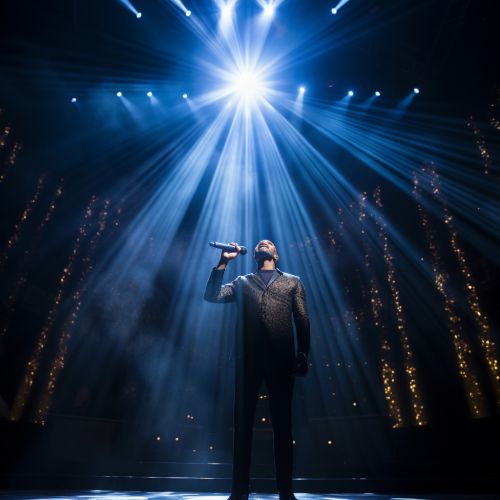Baritone
Overview
The Baritone is a type of classical singing voice whose vocal range lies between the bass and the tenor voice types. It is the most common male voice. Originally from the Greek "barytonos", meaning deep (or heavy) sounding, music for this voice is typically written in the range from the second F below middle C to the F above middle C (i.e. F2–F4) in choral music, and from the second A below middle C to the A above middle C (A2 to A4) in operatic music.


History
The use of the term "baritone" emerged as a tool to describe singers' voices in the early 19th century, which is largely attributed to the writings of Johann Friedrich Agricola. Prior to this, the term "bass" was used to describe all lower male voices.
Vocal Range
The baritone voice type is generally divided into the baryton-Martin, lyric baritone, Kavalierbariton, Verdi baritone, dramatic baritone, baryton-noble baritone, and the bass-baritone. Each of these subtypes primarily describes the role the baritone character plays in an opera.
In Choral Music
In choral music, the baritone part occupies a range similar to that of the Bass, but is usually written higher than the bass part in choral music. The baritone part is often sung by a small section of the choir.
In Opera
In opera, the baritone is a key voice. The roles vary greatly, from the hero to the villain to the comedic relief. Some of the most famous baritone roles in opera include Figaro in Mozart's The Marriage of Figaro and Verdi's Rigoletto.
In Popular Music
In popular music, such as rock and pop, the baritone voice is often overshadowed by the tenor and bass. However, some artists, such as Elvis Presley and Jim Morrison, have used their baritone voice to great effect.
Training and Technique
Training the baritone voice can be a complex process. It requires a balance of breath control, vocal cord strength, and resonance. Techniques such as breath support, vowel modification, and the use of the "mixed voice" can help a baritone singer achieve a powerful and resonant sound.
Notable Baritones
Throughout history, there have been many notable baritones who have made significant contributions to music. These include Dietrich Fischer-Dieskau, a German lyric baritone known for his interpretation of lieder; Leonard Warren, an American opera singer who was a leading artist for many years with the Metropolitan Opera; and Dmitri Hvorostovsky, a Russian opera singer who was known for his commanding stage presence and his expressive interpretations of lyric and dramatic roles.
